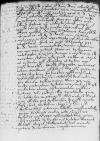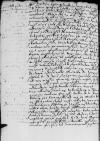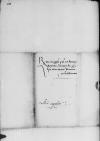Nihil est, quod mihi gratias agat Reverendissima Dominatio Vestra, si non gravate suscipio labores, quos mihi quandoque iniungit. Facio pro officio meo. Illud potius ne moleste ferat, quaeso, si quid aliquando praeter sententiam hic illius accidit.
De causa ⌊Ioannis Rumfeld⌋ aliquoties ad Reverendissimam Dominationem Vestram cum(?) scribere cuperem, moles negotiorum, quibus obruebar, prohibuit. Fuit ea mihi diligenter per Reverendissimam Dominationem Vestram commendata, verum adiuvari per me non potuit, nam cui testimonio nitebantur maxime domini consiliarii, id reiectum statim est, quod eadem in causa et iudicem esse aliquem, et testem non posse diceretur, quod si vocatae mulieres coram scabinis aliter se dixisse, quam in actis scriptum haberetur affirmassent. Valuisset fortassis contra fidem acturum hoc rarum testimonium, nunc ... illegible⌈...... illegible⌉ non modo contrarium testatae non sunt, sed est prolatum etiam instrumentum publici notarii, ubi eadem illa repetendo, quae in actis sive in processu fuerunt se ita et non aliter pro testimonio dixisse aperte fassae sunt. Creditum itaque plus est mulieribus actorum libellum confirmantibus, quam scabinis contra acta sua secus testatas mulieres asseverantibus, quam ipsae repetito testimonio se testatas dicerent. Relicto itaque fundamento vel reiecto potius dominorum consiliariorum  BCz, 1618, p. 450 hoc tantum cognoscendum veniebat exe[...] hidden by binding⌈[...][...] hidden by binding⌉ ex utero matris infans vivus ne esset [...] hidden by binding⌈[...][...] hidden by binding⌉ mortuus habendus, cum spiritum dixisse constaret. Qua de re cum alia iuris communis, alia Saxonum esset sententia, pronuntiatum fuisset secundum ius Saxonum hidden by binding⌈[m]m hidden by binding⌉, nisi iuris eius sententiam protulisset pars hidden by binding⌈[rs]rs hidden by binding⌉ adversa secundum se latam ⌊Lypsiae⌋ simul hidden by binding⌈[l]l hidden by binding⌉ etiam produxisset dominorum consiliariorum hidden by binding⌈[m]m hidden by binding⌉ litteras, quibus Lypsiam ea causa pro informatione fuit remissa. Qui cum in sententia sua ⌊senatus Gedanensis⌋ sententiam irritam non pronuntiassent, visi sunt hoc ipso eam confirmare. Itaque et ⌊maiestas regia⌋ confirmavit. Haec ego ideo Reverendissimae Dominationi Vestrae hidden by binding⌈[ae]ae hidden by binding⌉ scripsi pluribus, ut intelligat multum hi[...] hidden by binding⌈[...][...] hidden by binding⌉ in ista causa fuisse laboratum, neque mihi voluntatem, sed facultatem defuisse hidden by binding⌈[e]e hidden by binding⌉ ⌊Ioannis Rumfeld⌋ casuam ex mandato Reverendissimae Dominationis Vestrae adiuvandi.
BCz, 1618, p. 450 hoc tantum cognoscendum veniebat exe[...] hidden by binding⌈[...][...] hidden by binding⌉ ex utero matris infans vivus ne esset [...] hidden by binding⌈[...][...] hidden by binding⌉ mortuus habendus, cum spiritum dixisse constaret. Qua de re cum alia iuris communis, alia Saxonum esset sententia, pronuntiatum fuisset secundum ius Saxonum hidden by binding⌈[m]m hidden by binding⌉, nisi iuris eius sententiam protulisset pars hidden by binding⌈[rs]rs hidden by binding⌉ adversa secundum se latam ⌊Lypsiae⌋ simul hidden by binding⌈[l]l hidden by binding⌉ etiam produxisset dominorum consiliariorum hidden by binding⌈[m]m hidden by binding⌉ litteras, quibus Lypsiam ea causa pro informatione fuit remissa. Qui cum in sententia sua ⌊senatus Gedanensis⌋ sententiam irritam non pronuntiassent, visi sunt hoc ipso eam confirmare. Itaque et ⌊maiestas regia⌋ confirmavit. Haec ego ideo Reverendissimae Dominationi Vestrae hidden by binding⌈[ae]ae hidden by binding⌉ scripsi pluribus, ut intelligat multum hi[...] hidden by binding⌈[...][...] hidden by binding⌉ in ista causa fuisse laboratum, neque mihi voluntatem, sed facultatem defuisse hidden by binding⌈[e]e hidden by binding⌉ ⌊Ioannis Rumfeld⌋ casuam ex mandato Reverendissimae Dominationis Vestrae adiuvandi.
Quae de domino ⌊praeposito hidden by binding⌈[o]o hidden by binding⌉⌋ ⌊⌋ Reverendissima Dominatio Vestra, sane quam invitus accepi. Ad me nescio qua ex causa nihil scribit meque, alioqui occupatissimum, molesto admodum rescribendi labore levat.
Heri allatae sunt ex ⌊urbe⌋ litterae a ⌊Thoma⌋, quarum initium hoc est: “Hodie Dominationis Vestrae Reverendissimae litterae per ⌊Conarscki⌋ ad me in Martio datae hidden by binding⌈[ae]ae hidden by binding⌉ ex ⌊Florentia⌋ sunt mihi allatae una cum instructione scholae in ⌊Prussia⌋ instituendae et hidden by binding⌈[t]t hidden by binding⌉ rebus aliis, praeter tamen pelliceam”. In iis de ⌊Alexandro⌋ nulla fit mentio, datae autem sunt sedecima Iulii. Ex iis autem litteris ⌊nepotis⌋, quas perfert Reverendissimae Dominationi Vestrae ⌊Mauricius hidden by binding⌈[us]us hidden by binding⌉⌋, cognoscet procul dubio de illo affatim, mecum quoque ut communicet postea, rogo hidden by binding⌈[ogo]ogo hidden by binding⌉.
 BCz, 1618, p. 451
BCz, 1618, p. 451
Diploma, quod optat Reverendissima Dominatio Vestra, mittitur. Nova huc nulla afferuntur. Venit heri dominus Radivil ex ⌊Italia⌋. Is fuit in exercitu Christiano, narrat esse virorum centum triginta millia, profectos esse ad quattuor millia ⌊Turcarum⌋ esse, exercitum praeterea alium nullum, nisi quod esse apud ⌊Nandoralba⌋ bassam cum octoginta milibus et obviam proficisci velle dicitur. ⌊Ferdinandus rex⌋ subsequitur exercitum suum. Deus conatus Christianorum fortunet!
Exemplum litterarum
s(erenissimae) or s(acrae)⌈s(erenissimae)s(erenissimae) or s(acrae)⌉
⌊maiestatis regiae⌋ ad venerabile ⌊capitulum⌋ mitto Reverendissimae Dominationi Vestrae et cetera, quae voluit, remitto. Ad nuptias[1], ut ex ⌊reverendissimo domino⌋ cognovi quod, Reverendissimam Dominationem Vestram proficisci necesse erit. Quando autem id futurum sit, nescio. Ceterum visum est ⌊reginali maiestati⌋, ut ad aliud iter ineundum se pararet Reverendissima Dominatio Vestra: erit enim inter s(erenissimae) or s(acrae)⌈s(erenissimae)s(erenissimae) or s(acrae)⌉ ⌊maiestatis regiae⌋ commissarios una cum aliis de causa proscriptionis ⌊vicini sui⌋ cognitura. De loco nihil adhuc est constitutum. Ad ⌊dominum Culmensem⌋ scriptum fuisset, nisi quod Reverendissima Dominatio Vestra neque ad se, neque ad illum opus esse mandatis regiis scripserat. Deinceps autem minime praeteribitur. Doctor ⌊Rzeczicza⌋ hic agit, in ⌊urbem⌋ iterum cogitare dicitur, ⌊Alexandri⌋ causae favere se non obscure fert. Datae sunt per ⌊Thomam⌋ aliae litterae quinta Augusti. Ex iis quaedam in scheda descripta Reverendissimae Dominationi Vestrae mitto. Ad cardinales litteras missurum se ⌊reverendissimus dominus⌋ promittit, cum subscriptae fuerint. Deum precor, ut Reverendissimam dominationem Vestram diu servet incolumem. Cuius gratiae me commendo.
 BCz, 1618, p. 450 hoc tantum cognoscendum veniebat exe[...] hidden by binding⌈[...][...] hidden by binding⌉ ex utero matris infans vivus ne esset [...] hidden by binding⌈[...][...] hidden by binding⌉ mortuus habendus, cum spiritum dixisse constaret. Qua de re cum alia iuris communis, alia Saxonum esset sententia, pronuntiatum fuisset secundum ius Saxonum hidden by binding⌈[m]m hidden by binding⌉, nisi iuris eius sententiam protulisset pars hidden by binding⌈[rs]rs hidden by binding⌉ adversa secundum se latam
BCz, 1618, p. 450 hoc tantum cognoscendum veniebat exe[...] hidden by binding⌈[...][...] hidden by binding⌉ ex utero matris infans vivus ne esset [...] hidden by binding⌈[...][...] hidden by binding⌉ mortuus habendus, cum spiritum dixisse constaret. Qua de re cum alia iuris communis, alia Saxonum esset sententia, pronuntiatum fuisset secundum ius Saxonum hidden by binding⌈[m]m hidden by binding⌉, nisi iuris eius sententiam protulisset pars hidden by binding⌈[rs]rs hidden by binding⌉ adversa secundum se latam 


